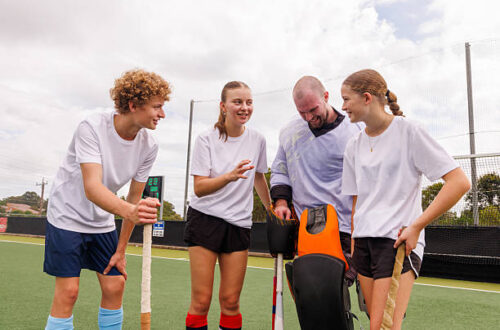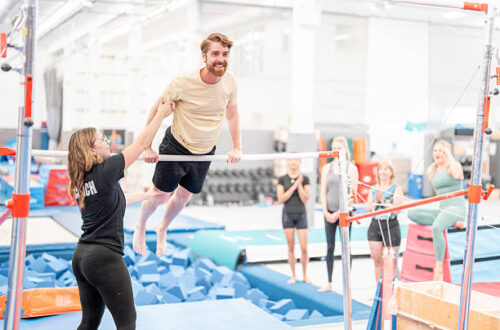Going to college is a huge step, full of new experiences, new friends, and a whole lot of homework. But while your academic life is important, it’s just one piece of the puzzle. To truly get the most out of your college years, you need to find a balance between studying and staying active and social. That’s where sports club come in.
For many students, joining a sports club is a game-changer. It’s not about being a star athlete or trying to make a varsity team. It’s about finding a community, staying healthy, and learning skills that will benefit you long after you graduate. Here’s why every student should seriously consider joining a sports club in college. 🥇
1. A Boost for Your Body and Mind 💪🧠
Contents
- 1 1. A Boost for Your Body and Mind 💪🧠
- 2 The Mental and Emotional Payoff
- 3 2. Finding Your People 🤝
- 4 3. Skills for Life (and Your Resume) 💼
- 5 The Ultimate Investment in Yourself
- 6 Club Sports vs. Varsity Sports: What’s the Difference?
- 7 Practical Tips for Getting Started
- 8 Frequently Asked Questions
- 9 Final Thoughts
College life can be a rollercoaster of late nights and early mornings. Regular physical activity helps keep your energy up and your mind sharp. Joining a sports club gives you a great reason to stay active.
- Stress Relief: Exercise helps relieve stress. It releases endorphins, which lift your mood and lessen anxiety and depression. When you run or swim, you forget about that upcoming paper or exam. You’re just focused on the moment, which helps you reset and de-stress.
- Better Focus and Memory:Physical activity boosts blood flow to the brain. This helps create more connections between nerves. As a result, you may see better concentration, improved memory, and sharper problem-solving skills. So, the time you spend practicing could help you remember information from lectures more effectively.
- Improved Sleep: Regular exercise helps regulate your sleep patterns. A solid night of rest is crucial for learning and memory. Being active helps you fall asleep faster. You also get deeper, more restorative sleep. This is especially valuable during finals week.
The Mental and Emotional Payoff
The benefits of a sports club extend far beyond the physical. The lessons you learn and the challenges you overcome can build a stronger, more resilient mind, preparing you for all of life’s challenges.
- A Powerful Antidote to Stress: Academic stress is real.6 Deadlines, exams, and the pressure to succeed can be overwhelming. A sports club gives you a strong way to release tension. The shared effort of a tough workout or the focus of a game helps you forget about school stress. It’s like a mental reset button that allows you to come back to your studies with a clear head and a better attitude.
- Building Mental Toughness: Sports teach you that sometimes, you will lose. You will make mistakes. But they also teach you how to get back up. Learning to handle setbacks, manage your emotions, and push through when you want to quit builds mental toughness. This resilience is a skill you can apply directly to your academic life and, later, to your career. You learn to handle pressure and deal with disappointment in a safe, supportive environment.8
- Finding Your Sense of Purpose: In the sometimes-overwhelming world of college, it’s easy to feel lost. Having a sports club gives you a sense of purpose outside of your classes. It gives you a reason to get out of bed in the morning, a goal to work toward (like winning the next game or mastering a new skill), and a community that relies on you. This sense of belonging and shared purpose is crucial for your overall happiness and well-being.
2. Finding Your People 🤝
One of the biggest challenges for new students is finding a sense of belonging. Sports clubs are an amazing way to make new friends and build a supportive community.
- Instant Connections: Joining a club puts you around people who share your interests. Whether you love soccer, volleyball, or ultimate frisbee, you have an easy way to start a conversation. This common bond breaks the ice and helps you form friendships that can last a lifetime.10
- Teamwork and Camaraderie: Being on a team means working toward a common goal. You’ll celebrate wins together and support each other during losses. You’ll also share laughs at practices and during trips to games. This experience builds strong bonds and helps you feel connected, especially in a big college setting.
- A Built-In Support System: Your teammates are more than just people you play with. They’re a built-in support network. They’ll understand the pressures of college life and can offer encouragement, study help, or just a listening ear.
- A Lifelong Network of Friends 🤝The friendships you build in a sports club are often different from other friendships you make in college. You’re not just hanging out. You’re facing challenges together, celebrating victories, and sharing disappointments. These shared experiences create a unique bond that can be the start of a lifelong network. Think about it: Your teammates will be the first people to celebrate your victories and the ones who will support you after a tough loss. They’ll be the ones you get to know beyond a casual classroom setting, seeing each other at your best and your worst. This “team family” can become a powerful support system long after you’ve left campus. In real life, your college friends from sports clubs can be valuable. They might become professional contacts, future business partners, or just reliable friends. This is a network built on trust, respect, and shared hard work—a foundation that is truly priceless.
- Learning to Communicate and Resolve Conflict 🗣️Being on a team is a masterclass in communication. You have to learn how to talk to your teammates clearly, especially during a fast-paced game or a stressful practice. This helps you develop the ability to give and receive feedback, which is a skill that is valuable in any job. Beyond that, sports clubs also teach you how to resolve disagreements. Not everyone on a team will get along perfectly all the time. Learning how to handle conflict, listen to others’ points of view, and work toward a common goal, even when you don’t agree, is a vital life skill. It teaches you to put the team’s success ahead of your personal feelings, a lesson that will serve you well in any group project or future workplace.
- Networking for the Future: Don’t underestimate the power of your club sports network. The friendships you make in a sports club can easily turn into valuable professional connections. Your teammates may study different majors or come from various backgrounds. They might become future colleagues, job references, or even business partners. The trust and respect you build on the field can transfer directly to the professional world.
3. Skills for Life (and Your Resume) 💼
Beyond the physical and social perks, being in a sports club teaches you valuable skills that look great on a resume and are essential for any career.13
- Time Management: Juggling classes, homework, a social life, and practice is tough. It forces you to get organized, prioritize tasks, and make the most of your time.14 This is a skill that employers are always looking for.
- **Leadership and Teamwork:** Club sports are usually student-run. This gives you chances to be a leader, like a team captain or club president. You’ll learn to communicate well, resolve conflicts, and motivate others. These skills are important in the professional world.
- Resilience: Not every game is a win. Learning to handle disappointment, bounce back from a loss, and stay motivated shows resilience and a strong character. This ability to persevere through setbacks is a valuable trait that will serve you well in any job.
The Ultimate Investment in Yourself
Think of your college years as a major investment in your future. While your degree is the most important part, the experiences you gain outside the classroom are what truly set you apart. A student sports club is one of the best investments you can make.
- Learning to Lead by Example: Leadership isn’t just for the team captain. It’s about showing up on time, giving your best effort, and supporting your teammates. These small actions inspire others and build trust. When you take on a leadership role, you learn how to make decisions, handle responsibility, and communicate a vision to your team.17
- Building a Practical Resume: You can absolutely list your club sports experience on your resume.18 But don’t just write “soccer club.” Instead, highlight the skills you gained.
- “Led a team of 20 in weekly games, boosting communication and teamwork.”
- “Managed schedules and logistics, showing strong organizational skills.”
- The Art of Collaboration: Teamwork isn’t just about passing a ball.19 It’s about collaborating with diverse people. You’ll work with teammates who have different communication styles, personalities, and backgrounds. Learning to respect these differences and work together toward a common goal is a skill that is priceless in any workplace.
Club Sports vs. Varsity Sports: What’s the Difference?
You might be thinking, “I’m not good enough to play college sports.” But that’s the beauty of club sports!
- Varsity Sports are the highly competitive, officially recognized college teams (NCAA). They require a massive time commitment, often with daily practices and strict schedules. They’re for top-tier athletes.
- Club Sports are student-run groups that compete with other schools. They have a flexible schedule. This creates a nice balance between competition and enjoying life outside of sports. You can keep playing a sport you love without the stress of a full-time commitment. They often welcome all skill levels, from beginners to experienced players.22
Practical Tips for Getting Started
Ready to give it a shot? Here’s how to find the perfect club for you:
- Check the Campus Website: Most universities have a dedicated page for student clubs and organizations.
- Go to Club Fairs: At the beginning of each semester, schools usually host a fair where all the clubs have booths. It’s a great way to talk to current members and get a feel for the team.
- Overcoming the Fear of Not Being Good Enough: This is a common feeling, but don’t let it stop you. Remember that most people in club sports are there to have fun and stay active, not to be a professional athlete. Just show up with a positive attitude, and you’ll find that people are welcoming and encouraging.
- Making the Time: It might seem like you don’t have time, but having a structured schedule for a sports club can actually help you manage your time better. It forces you to block out specific hours for practice and then be more productive with the rest of your day.23
Frequently Asked Questions
Q1: Do I need to be good at the sport to join?
No! Most club sports are open to everyone, regardless of skill level.24 It’s a great chance to learn a new sport or just play for fun.
Q2: How big is the time commitment?
This can vary by club, but most have a much more relaxed schedule than varsity sports. You might have practices a few times a week, with games on weekends. It’s very manageable.
Q3: Is it expensive to join a club?
Some clubs charge dues for equipment, uniforms, and travel. However, these fees are often quite low. They are usually cheaper than private gym memberships or recreational leagues.
Q4: What if I have an injury?
Most club sports are understanding of injuries. Communicate with your club’s leadership about your situation. They can often provide a supportive role for you to stay involved with the team while you recover.
Q5: What if I don’t get along with my teammates?
This can happen in any group. The best thing to do is focus on the shared goal of the sport. As a last resort, you can look for another club or a different activity, but most of the time, working through differences is a valuable skill in itself.
Final Thoughts
College is a unique time in your life. It’s a chance to grow, to learn, and to find out who you are. While your classes are important, don’t miss out on the other opportunities available to you. Joining a sports club is a simple step that can help you stay healthy, meet amazing people, and build skills that will last a lifetime. So, why wait? Go find your team and start building your college experience beyond the classroom.





